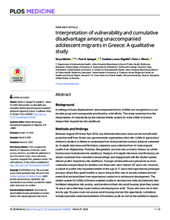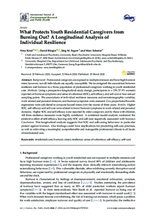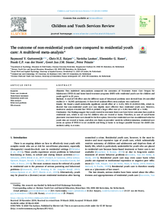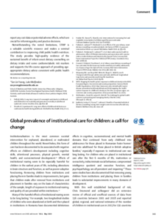Displaying 271 - 280 of 1482
The current exploratory study is the first to look at the challenges and barriers in this transitional life stage of 23 Israeli Arab young adults, from their own perspectives, after leaving residential care.
The purpose of this study was to test the effectiveness and feasibility of a brief trans diagnostic Acceptance and Commitment Therapy (ACT) group intervention for youth with comorbid problems in residential care.
This study examines how the interpretation of vulnerability by the national shelter system for male UAMs in Greece shapes their trajectories into adulthood.
This study investigated the association between resilience and burnout in a Swiss population of professional caregivers working in youth residential care.
This guidance is to support the management of children and young people living in children's homes, residential special schools and colleges, and other residential facilities during the COVID-19 crisis.
This multilevel meta-analysis compared the outcomes of Treatment Foster Care Oregon for Adolescents (TFCO-A) and home-based treatment programs (HBT) with residential youth care for children and youth aged 0 to 23 years.
This research aimed to construct an explanatory theory of how residential staff make sense of, and use, attachment theory in practice.
The purpose of this study is to describe the emotional and behavioural status and the associated factors among inmates aged 11-16 years of children’s homes in the Gampaha Probationary Division of Sri Lanka.
The aim of this study was to estimate global-level, regional-level, and country-level numbers and percentages of children living in institutional care.
This comment piece by Charles H Zeanah and Kathryn L Humphreys accompanies a study on the number of children in institutional care around the globe, entitled 'Prevalence and number of children living in institutional care: global, regional, and country estimates,' published in the Lancet in March 2020.






